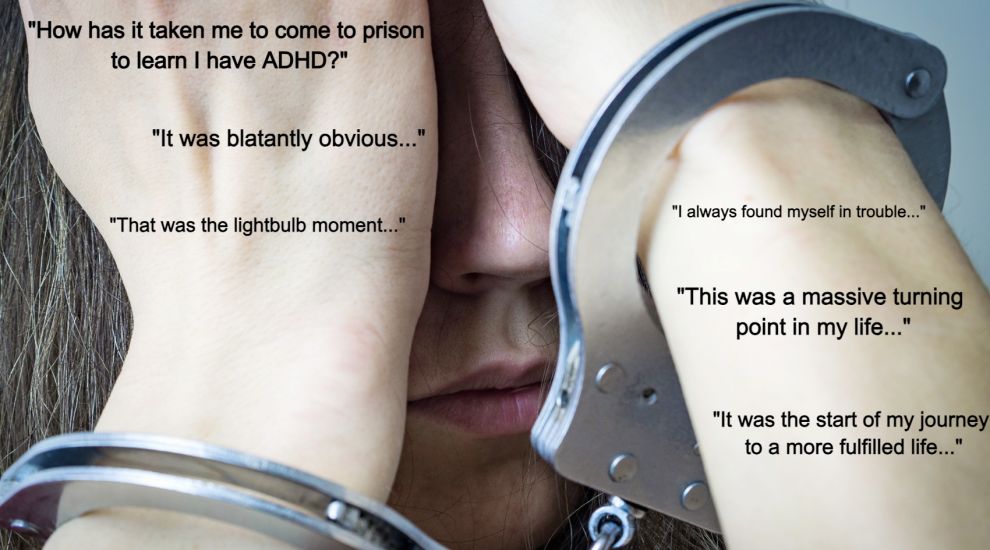


After a new report revealed that more than half of local inmates are affected by mental health issues, a former prisoner has opened up about how learning she had ADHD while at La Moye was a "massive turning point” in her life.
A quarter of prisoners in Britain are believed to have ADHD, which is significantly higher than the prevalence of 2% to 4% in the general population, according to a 2022 report by the ADHD Foundation.
While the data about the number of prisoners with ADHD is lacking in Jersey, the Jersey Independent Prison Monitoring Board's annual report 2023 said that mental health is an area that has been "constantly at the fore".
The report, which identified that at least half of all prisoners suffer from mental health issues, came after a former prisoner shared her in-depth experience and struggles with ADHD while in prison.

Pictured: The Jersey Independent Prison Monitoring Board identified mental health as a significant concern, affecting over half of prisoners.
In her testimony, Steph – whose name has been changed to protect her anonymity – called for increased awareness and support within the prison system.
She suggested that support groups for inmates with ADHD should be set up, and stressed the importance of understanding and accepting neurodiversity.
Sharing the testimony on social media, the States of Jersey Prison Service highlighted the benefits of increased recognition and treatment of ADHD in adult prisoners.
They said that a diagnosis can be validating for many prisoners, allowing them to come to terms with their offending histories and accept input from mental health services.
Treatment can also reduce poor behaviour and encourage attendance at educational, occupational and therapeutic activities, according to the Prison Service.
Steph spoke about the profound impact of learning about ADHD on her self-awareness and understanding while validating her experience.
She said that, coming into custody, she felt "lost and disconnected".
"My aim was to rectify that and get the relevant help," said Steph.
"Although I have always been bubbly and confident on the outside, inside I was always battling with self-esteem and confidence. I never felt good enough, smart enough or pretty enough."
She added: "I always found myself in trouble and extreme situations. I went to an all-girls school and would always compare my life to the girls I went to school with and how they were doing so much better than I was.
"Due to my lack of self-confidence and self-worth, my choice of partners was extremely poor. I was in a long abusive relationship that ultimately led me to prison. I knew that although I was at rock bottom, this was my way out."
Steph explained that her first notion of an ADHD diagnosis was when a prison officer asked her if she had the condition.
"At the time I had no understanding of what ADHD was," she explained. "To my knowledge, it was the hyper-naughty kids.
"Ironically, I suppose, that would have been something I would have been labelled as."

Pictured: Steph said she felt "lost and disconnected" when she arrived at La Moye.
The prison officer told Steph that he had been diagnosed with ADHD many years ago and taken medication for the condition ever since.
Steph said: "He went through many of the symptoms such as hyperactivity, disorganisation, procrastination, impulsiveness and inattention.
"Even as he was explaining this to me, I was fidgeting and getting distracted although I was interested in the conversation. It wasn't until he pointed out my inattention in that moment that it resonated with me.
"I have always struggled with this, trying to focus during conversations is so difficult. I never gave it enough thought that traits like that are an issue for me.
"This is another example of how unaware of myself I was. He strongly suggested that I look into ADHD more."
Steph spoke to some of the women on her wing at La Moye about the possibility of her having ADHD.
Her inmates "laughed and basically said it was blatantly obvious", and one of them gave her a magazine article about the condition.
"Everything I was reading was overwhelmingly relevant to me, my past, my characteristics, my struggles and even my current circumstances," said Steph.
"It was like someone had written this article about me. I suddenly felt relieved and could understand what this major void I had with myself was all about."

Pictured: Steph's fellow inmates said that her ADHD was "blatantly obvious".
Steph explained that, at the time, she had a "very difficult and challenging relationship" with her Mum.
However, when she read the article, Steph felt the need to call her about her "revelation".
"I read her the article," said Steph. "Instantly, she also sounded relieved. She told me that recently someone had mentioned it to her about me, and she had done some research into it. But because of our relationship being tricky she was hesitant to mention it to me.
"I really appreciated the fact she felt that was because when you have no understanding of what is deemed a 'mental health' problem and someone throws a label at you that means there is something wrong with you, you could feel defensive and I would have until I knew exactly what it was and everything that surrounds it."
Steph described this moment as a "massive turning point in my life".
She said: "Once I looked into it more with what was available to me being in prison which was very limited other than flicking through magazines and trying to ask healthcare staff who were very busy and, at the time, were understaffed and dealing with all sorts of important issues, so I didn't like to bother them too much.
"I wanted to speak to the officer who suggested this to me but he very rarely worked on the female wing. I decided to book an appointment with the GP to see what or if they could help me in any way.
"Eventually I had an appointment and became aware of the extensive waiting list for an initial assessment, let alone a diagnosis which was roughly two-plus years."
Steph went through her symptoms with a doctor, admitting that it "all seemed so obvious by that point".
"I couldn't help wondering how this had all only just come to my attention," said Steph.
The doctor informed her that she would be sent a questionnaire to do with examples of ADHD traits which would initiate the diagnosis process.

Pictured: Steph highlighted the importance of ongoing support and education about ADHD in the prison system and in wider society.
Steph said: "Another point the GP mentioned was to discuss some of the questions with family members as the assessments for a diagnosis refer back to childhood behaviour and school reports.
"After speaking to my Mum, Dad and my older brother separately once I received the questionnaire and talking about my school reports all said 'disruptive, class clown, always shouts out, can't wait her turn and has lots of energy'.
"It all kept becoming more and more apparent to me that I have always, since a child, portrayed not just some but all traits of ADHD."
Although Steph's diagnosis has now provided her with a sense of relief and understanding, she raised concerns about how it had not been previously picked up by anyone.
"How has it taken me this long to be brought to this? In fact, how has it taken me to come to prison to learn this?" she asked.
"I went to good schools but was always in trouble, I struggled to maintain jobs, I had trouble with the police... how had no one picked up on it?
"I remember my Mum telling me she felt guilty as a parent. But she wasn't to know. She's not a professional nor educated about neurodiversity, she just had a hyper daughter. I suppose most people aren't aware of neurodiversity unless they need to be."
She shared how her diagnosis has helped her control her actions and impulses.
"I have always been quite disruptive and impulsive," said Steph.
"I got into one altercation with another female prisoner where tensions were building for a while and we both ended up being placed on a discipline report.
"This was prior to understanding ADHD. I acted on impulse and regret my actions afterwards which was a pattern of behaviour for me.
"Once I understood more about myself, my reactions and learning to control impulses I never got into any situations like that again.
"I could understand when I would feel a certain way when I got angry and thinking through consequences became a lot more apparent to me, when previously this would never have been something I would consider."
Steph explained that, following her ADHD diagnosis, she spent almost two-and-a-half years in prison without getting in trouble.
"Surely that isn't a coincidence given my past behaviour, not just in custody," she said.
"In terms of rehabilitation, this was the answer and the start of my journey to a more fulfilled life, new opportunities, more confidence in myself and better healthier relationships with family and friends.
"When I got out I was still on the waiting list for a diagnosis, I was very fortunate to have family support and they funded the assessment process privately, after getting out of prison and changing my life around they felt this was a necessary time.
"I am very aware a lot of people aren't in a position to fund a private diagnosis as it is expensive, therefore the waiting list is two plus years, possibly longer.
"My family and I felt the medication route is something that could help me further."
Steph was diagnosed with severe ADHD upon her release from prison.
"To me, this wasn't the turning point," she said. "It was back when I read that first article in prison, that was the lightbulb moment."
Now, Steph explained that she is "passionate about how just learning about yourself and being self-aware can change your life for the better".
"Reflecting on your life previously with the understanding some things are because your brain is wired up differently," she said.
"I didn't want to always get into trouble and regret silly things I did without thinking. I didn't want to always feel disassociated and feel like I was stupid or I couldn't do it."
Pointing to statistics which show that one-in-four prisoners in the UK prison system have ADHD, Steph said: "Surely ADHD plays a role in offending behaviour."
She continued: "The system wants to reduce re-offending and rehabilitate, I am certainly no professional but maybe by trying to educate prisoners who show traits of ADHD as to what is most likely going on for them internally, then this will assist the re-offending rates and help rehabilitate individuals like it did for me."
Acknowledging the shortage in the mental health sector and the difficulty getting a diagnosis, Steph said that "the first step is purely being aware of what ADHD actually is and educating people so they can have that lightbulb moment".
She explained that she believes support groups for prisoners with ADHD could be beneficial and provide a "place where like-minded people can come together, talk openly about being or feeling different and similar struggles they face".
"I am now medicated for my ADHD," explained Steph.
"While this is a process in itself, it does help with concentration, even being able to write this [testimony] would have previously been like tackling mission impossible.
"I can focus more on things that need doing. Finding the right medication takes time, it can be a bit stressful as I guess it alters your personality slightly and takes time to get used to.
"There are other options to take like therapy or even meditation."
She continued: "I am still on a journey with my ADHD and I know it sounds cliché but there really isn't any other way to describe it.
"We will never stop learning about ourselves but realising you're neurodiverse is a major curveball and only positive things can come from it.
"I am so pleased it is being made more aware in society, there is still a long way to go but it is on the right path. People deal with diagnosis differently, so support is vital."
"Everyone is battling with something one way or another but if we can celebrate people's differences, we can make life a little more manageable," Steph added.
Comments
Comments on this story express the views of the commentator only, not Bailiwick Publishing. We are unable to guarantee the accuracy of any of those comments.